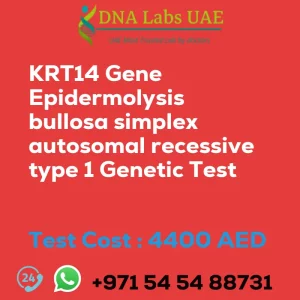EDA Gene Ectodermal Dysplasia Hypohidrotic X-Linked Genetic Test
At DNA Labs UAE, we offer the EDA Gene Ectodermal Dysplasia Hypohidrotic X-Linked Genetic Test for individuals suspected of having this genetic disorder. This test helps in the diagnosis and identification of the specific genetic cause of Hypohidrotic Ectodermal Dysplasia (HED).
Test Details
The EDA gene, also known as ectodysplasin A, is associated with the genetic disorder HED. This disorder primarily affects males as it is passed down from mothers to their sons. HED affects the development of ectodermal structures, including the skin, hair, teeth, and sweat glands.
The EDA Gene Ectodermal Dysplasia Hypohidrotic X-Linked Genetic Test utilizes NGS (Next-Generation Sequencing) technology to analyze the DNA sequence of the EDA gene. This advanced testing technique allows for the simultaneous analysis of multiple genes or the entire genome, providing a comprehensive view of an individual’s genetic makeup.
By identifying mutations or variations in the EDA gene associated with HED, this test helps in the diagnosis of the disorder. Common symptoms of HED include sparse or absent hair, abnormal teeth development, and reduced or absent sweat production. Other symptoms may include dry skin, heat intolerance, and respiratory problems.
Test Components and Price
The EDA Gene Ectodermal Dysplasia Hypohidrotic X-Linked Genetic Test is priced at 4400.0 AED. The sample condition required for testing includes blood or extracted DNA, or one drop of blood on an FTA card.
Report Delivery and Method
After the sample is collected, the report will be delivered within 3 to 4 weeks. The testing method utilized is NGS technology, ensuring accurate and reliable results.
Doctor and Test Department
This test is performed under the supervision of a dermatologist and is conducted in the Genetics department of our laboratory.
Pre Test Information
Prior to the EDA Gene Ectodermal Dysplasia Hypohidrotic X-Linked Genetic Test, it is important to provide the clinical history of the patient suspected of having HED. Additionally, a genetic counseling session may be conducted to draw a pedigree chart of family members affected by the disorder.
Importance of the Test
NGS genetic testing for the EDA gene is crucial in diagnosing HED and determining the specific genetic cause of the disorder in an individual. This information is essential for genetic counseling, family planning, and potentially guiding treatment options or interventions for affected individuals.
It is advisable to consult with a healthcare professional or a genetic counselor to discuss the appropriateness and availability of NGS genetic testing for HED. They can provide guidance on the testing process, interpretation of results, and the implications for the individual and their family.
| Test Name | EDA Gene Ectodermal dysplasia hypohidrotic X-linked Genetic Test |
|---|---|
| Components | |
| Price | 4400.0 AED |
| Sample Condition | Blood or Extracted DNA or One drop Blood on FTA Card |
| Report Delivery | 3 to 4 Weeks |
| Method | NGS Technology |
| Test type | Osteology Dermatology Immunology Disorders |
| Doctor | Dermatologist |
| Test Department: | Genetics |
| Pre Test Information | Clinical History of Patient who is going for EDA Gene Ectodermal dysplasia, hypohidrotic, X-linked NGS Genetic DNA Test. A Genetic Counselling session to draw a pedigree chart of family members affected with EDA Gene Ectodermal dysplasia, hypohidrotic, X-linked NGS Genetic DNA Test gene EDA |
| Test Details |
EDA gene, also known as ectodysplasin A, is associated with a genetic disorder called hypohidrotic ectodermal dysplasia (HED). HED is an X-linked disorder, meaning it is primarily passed down from mothers to their sons. This disorder affects the development of ectodermal structures, which include the skin, hair, teeth, and sweat glands. NGS (Next-Generation Sequencing) genetic testing is a technique used to analyze the DNA sequence of the EDA gene. This type of testing allows for the simultaneous analysis of multiple genes or the entire genome, providing a comprehensive view of the individual’s genetic makeup. NGS genetic testing for the EDA gene can identify mutations or variations in the gene that are associated with HED. These mutations can disrupt the normal function of the EDA gene, leading to the characteristic symptoms of the disorder. Some common symptoms of HED include sparse or absent hair, abnormal teeth development, and reduced or absent sweat production. Individuals with HED may also have dry skin, heat intolerance, and respiratory problems. NGS genetic testing for the EDA gene can help diagnose HED and determine the specific genetic cause of the disorder in an individual. This information is crucial for genetic counseling, family planning, and potentially guiding treatment options or interventions for affected individuals. It is important to consult with a healthcare professional or a genetic counselor to discuss the appropriateness and availability of NGS genetic testing for HED. They can provide guidance on the testing process, interpretation of results, and the implications for the individual and their family. |








